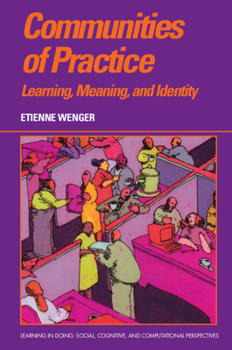Communities of Practice: Learning, Meaning, and Identity
(Part of the Learning in Doing: Social, Cognitive and Computational Perspectives Series)
Select Format
Select Condition 
Book Overview
Learning is becoming an urgent topic. Nations worry about the learning of their citizens, companies about the learning of their workers, schools about the learning of their students. But it is not always easy to think about how to foster learning in innovative ways. This book presents a framework for doing that, with a social theory of learning that is ground-breaking yet accessible, with profound implications not only for research, but also for all...
Format:Paperback
Language:English
ISBN:0521663636
ISBN13:9780521663632
Release Date:September 1999
Publisher:Cambridge University Press
Length:336 Pages
Weight:1.07 lbs.
Dimensions:0.8" x 5.9" x 8.9"
Customer Reviews
5 ratings
Fascinating and Unusual approach to Learning
Published by Thriftbooks.com User , 16 years ago
Learning is much more than acquiring and repeating new information. This book combines learning, meaning and identity by studying a group of people who are claims adjusters in an insurance company. The level and complexity of analysis is fascinating and the connection between identity and learning is quite clear. This level of analysis is largely missing in most discussions of learning because the educational establishment has not yet realized that a) learning can and often does occur without teaching; b) learning only happens when the knowledge means something to the learner and c) learning is a social phenomenon. I was intrigued by this book even though it took a lot of work to understand. For anybody who seirously interested in expanding his or her own understanding of learning I recommend this highly.
Thought Provoking
Published by Thriftbooks.com User , 19 years ago
This book is written primarily for academics. Wenger challenges educational institutions to re-think their basic assumptions about learning (e.g., its social aspects, its relationship to practice, and the role of teaching). I found the book to be very thought provoking, but I would recommend his 2002 book, "Cultivating Communities of Practice," for practitioners. Michael Beitler Author of "Strategic Organizational Learning"
brilliant
Published by Thriftbooks.com User , 23 years ago
One cannot be practically effective without being grounded in a philosophy. Philosophy leads to strategy, and strategy leads to a coordinated set of tactics and the opportunity to be proactive. Without it, tactics are reactive.This book provides an outstanding philosophical guideline for making sense of the workplace and communities of practice. It is easy to divine practical solutions to common workplace issues and problems as you read it. His vignettes show mistakes that businesses make, and how the communities compensate. Preventing those mistakes in your business allows your communities to solve other problems. Additionally, you will understand where, why, and how your communities and how they help you, and because of this recognition, perhaps you can continuously remove the obstacles to their success.
excellent conceptual thinking
Published by Thriftbooks.com User , 23 years ago
For those grappling with the need to understand and talk about how people come together and interact beyond the org. chart, this book has a lot to offer. Theoretically-based, it focuses on a social theory of learning that is broad enough to cover a wide range of human activities, well beyond what we would normally consider to be 'learning'. 'Communities of practice' offers a comprehensive framework for understanding and analysing what people do in the context of their social milieu. The author includes many examples and uses a work-place vignette to illustrate the relevance and power of his ideas. If you are not afraid of theory and abstraction and are open to new concepts, this book may indeed be revolutionary.
A thought-provoking inquiry on learning as a social process.
Published by Thriftbooks.com User , 26 years ago
A wonderful book that uses communities of practice as the entry-point to think about learning along several rich dimensions (e.g., meaning in relation to participation and artifacts, the relationship between identity and learning).Definitely worth a slow, reflective reading.Provides a lot of context for thinking about organizational learning.





